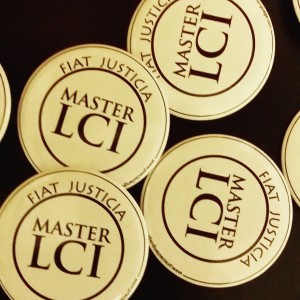You may have seen some interpreters around the courthouse wearing a white button that bears their credential—Master Licensed Court Interpreter (MLCI). The slogan across the top reads Fiat justicia — “Let justice be done.” 
Key Facts
The purpose of the Fiat Justicia campaign is to raise awareness about the importance of using a qualified court interpreter for every court hearing that is on the record. Everyone who hires or uses court interpreter services needs to be aware of court interpreter credentials to ensure an accurate record:
- A Master Licensed Court Interpreter for court proceedings on the record (including depositions).
- A Basic Licensed Court Interpreter for proceedings that are off the record (such as administrative hearings and municipal courts).
Unfortunately, some companies routinely send uncredentialed individuals to interpret unless the client specifically requests an MLCI. I have witnessed testimony butchered so badly by these people posing as court interpreters that the judge intervened to correct the obvious errors. In other cases, interpretation by an unqualified interpreter has led to delay while an MLCI is located, and appeal based on improper certification. Possibly the worst case scenario is that the issue is not detected, and the case moves on with a severely compromised record.
Professional MLCIs are trained to render accurately the entire message without adding or omitting any meaning. We are also trained to maintain an absolutely neutral role in the proceedings (avoiding even the appearance of partiality, especially in the eyes of a jury) to avoid any undue effect on due process.
Amateur interpreters, on the other hand, make major content errors, but more insidious are subtle choices such as cleaning up a witness’s testimony by tempering the tone (e.g., leaving out curse words) or interpreting testimony more formally than the witness’s speech, to comply with court protocol (such as adding “sir” and “your honor” when the witness has made no such courtesy).
Interpretation by Attorney or Staff
Some bilingual attorneys believe they can save their client money by doing the interpreting themselves while they examine the witness, or by bringing a bilingual staff member to interpret. In the first instance, it is impossible for one individual to multi-task in this way because an attorney cannot simultaneously be a zealous advocate for her client while also complying with the interpreter’s oath to give an accurate and impartial interpretation. This is an inherent conflict of interest and one individual cannot wear both hats at the same time without violating one of the oaths. And, practically speaking, I have seen many a court reporter give up on reminding the interpreter/attorney which questions and answers have not been stated in English, and the hearing is left with a partial record.
In the second situation, bilingual staff are typically accustomed to an advocacy role and often attempt to help their client in different ways while they are interpreting (such as giving instructions to the witness while on the stand or summing up what they expect the judge to say). Now, if a law firm employee possesses university-level proficiency in both languages, has professional interpreting skills and understands the ethics involved in interpreting in court, he should have no difficulty passing the Licensed Court Interpreter exam (a series of mock testimony situations lasting less than one hour) with the score needed for a Master endorsement—the established minimum for an interpreter to work on the record.
Conversely, a person who cannot meet this requirement has proven he does not meet minimum proficiency standards for court interpreting.
Protect Your Record – Hire an MLCI
In short, allowing an uncredentialed interpreter to interpret in your case is akin to allowing an attorney to practice law even though he hasn’t quite been able to pass the bar exam, or allowing anyone who can type to prepare your transcripts (and remember, interpreters cannot go back to listen to the tapes and touch up anything that was misheard—we get only one shot and that is what goes on your record).
Court interpreters are neutral parties in a proceeding, present to ensure that court users who are not fully proficient in English have equal access to justice as anyone else. Master Licensed Court Interpreters are trained to comply with the law and provide impartial, professional services; in the interest of justice, don’t accept anything less.
Questions? Email Holly at holly@precisolanguage.com
——-
Content Copyright © 2015, Preciso Language Services
PERMISSION TO REPRINT: You may use any items from this article in your print, blog, magazine or electronic newsletter. But in order to do so, you must include the following paragraph, including a link to www.PrecisoLanguage.com.
“Information courtesy of Preciso Language Services and www.PrecisoLanguage.com, a translation and interpreting firm owned by Certified Translator and Master Licensed Court Interpreter Holly Behl.”
